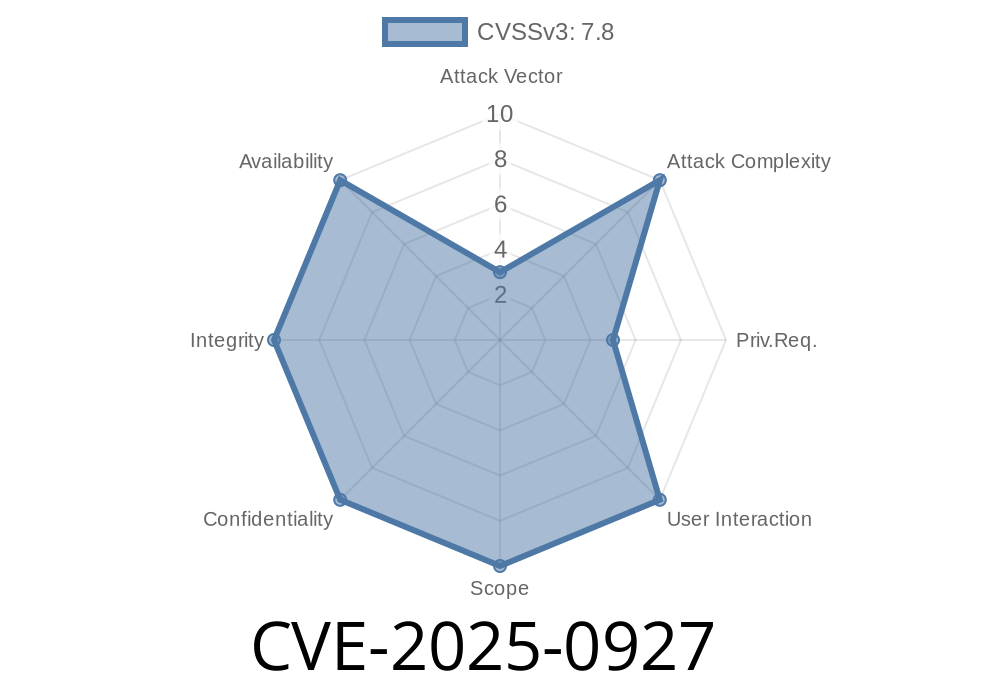On May 24, 2025, the security community learned about a newly reported Linux kernel vulnerability: CVE-2025-0927. Researcher Attila Szász disclosed a dangerous heap overflow bug in the HFS+ filesystem implementation within the Linux Kernel. This defect allows attackers to trigger a system crash (denial of service), or in the worst-case scenario, execute arbitrary code each time a malformed HFS+ file system image is mounted.
In this post, we'll break down what happened, showcase some proof-of-concept code, and discuss how attackers could exploit this weak spot. We'll keep the language simple and direct, so everyone gets the impact—even if you’re not a hardcore kernel hacker.
What is HFS+ and Why Does this Matter?
HFS+ is a file system developed by Apple for macOS. However, Linux systems also support it, making it possible to mount HFS+ volumes (like macOS partitions or external drives) natively.
If you run any flavor of Linux with HFS+ support enabled, pay attention! A vulnerability here lets someone with a specially crafted filesystem image (could even be a USB stick!) potentially take control of your system or crash it.
Technical Breakdown
CVE-2025-0927 is located in the code that parses HFS+ volumes when mounted. When mounting, the kernel driver reads in file system structures, including directories and catalog records. Attila Szász discovered that by manipulating certain HFS+ fields (such as the number of extents or catalog nodes), an attacker can make the kernel allocate a chunk of memory and then write past it, corrupting the heap.
Such heap overflow conditions are dangerous because they allow attackers to smash adjacent memory, overwrite data structures or even craft new code execution paths.
Symptoms:
Proof-of-Concept: Triggering the Bug
While we won’t link to weaponized exploits, here’s a safe code snippet (Python 3 + mkfs) that creates a basic image to test the mount operation. This helps highlight how exploitation begins:
# WARNING: Do NOT run on a system with important data!
# Create a bogus HFS+ image with overlarge Catalog records
import os
from subprocess import run
# Create a 10MB blank file
with open("malicious_hfs.img", "wb") as f:
f.seek(10 * 1024 * 1024 - 1)
f.write(b"\x00")
# Format as HFS+ (requires hfsprogs)
run(["mkfs.hfsplus", "malicious_hfs.img"])
# Now, you would run a binary patcher to modify extents/catlog
# records to overflow the allocation size (omitted for safety).
print("Malicious HFS+ image created. Mounting will trigger the bug on vulnerable kernels!")
A real exploit would further patch "malicious_hfs.img" to set certain fields past what the HFS+ parser expects, hitting the heap overflow.
Why This Is Exploitable
Linux, when mounting an HFS+ image, processes file system records whose size and count are declared within the filesystem. The vulnerable code does not correctly validate these numbers before allocating and copying memory. For example (simplified C code from the kernel):
// Example (NOT the real code)
int catentries = read_u16_le(hfsplus_node->num_records);
char *buf = kmalloc(catentries * RECORD_SIZE);
memcpy(buf, src, catentries * RECORD_SIZE); // No check!
An attacker sets catentries to a huge value, causing kmalloc to allocate a chunk that is smaller than what memcpy writes, overflowing the buffer and corrupting kernel memory.
Denial of Service: Mounting a malicious image crashes the system.
- Root Exploitation: Skilled attackers may chain this with other bugs to run arbitrary code as root, fully compromising Linux boxes, servers, desktops, and even cloud VMs with HFS+ support enabled.
Who is Affected?
- Linux distributions with HFS+ support in the kernel (most major desktop/server distros)
- Systems where users can plug in or mount external drives/images
`
echo "blacklist hfsplus" | sudo tee -a /etc/modprobe.d/blacklist.conf
`
3. Be Cautious: Don’t mount untrusted drives, USBs, or image files, especially from unknown sources.
Patch Status
- Upstream kernel patch: As of this writing, patches are in review. See the kernel mailing list for updates: LKML Patch
References
- CVE-2025-0927 at cve.org
- Attila Szász’s advisory
- Linux kernel archive (HFS+ code)
- Upstream patch discussion
Conclusion
CVE-2025-0927 is a big deal because it's a local kernel heap overflow reachable just by mounting a file system image. The fix is coming, but until then, keep your kernel updated, avoid mounting weird drives, and turn off HFS+ support if you're not using it.
Stay safe, patch your systems, and stay tuned for more updates on this vulnerability!
*Do not test this vulnerability on production systems. For education only. Always use isolated environments for security research!*
Timeline
Published on: 03/23/2025 15:15:12 UTC
